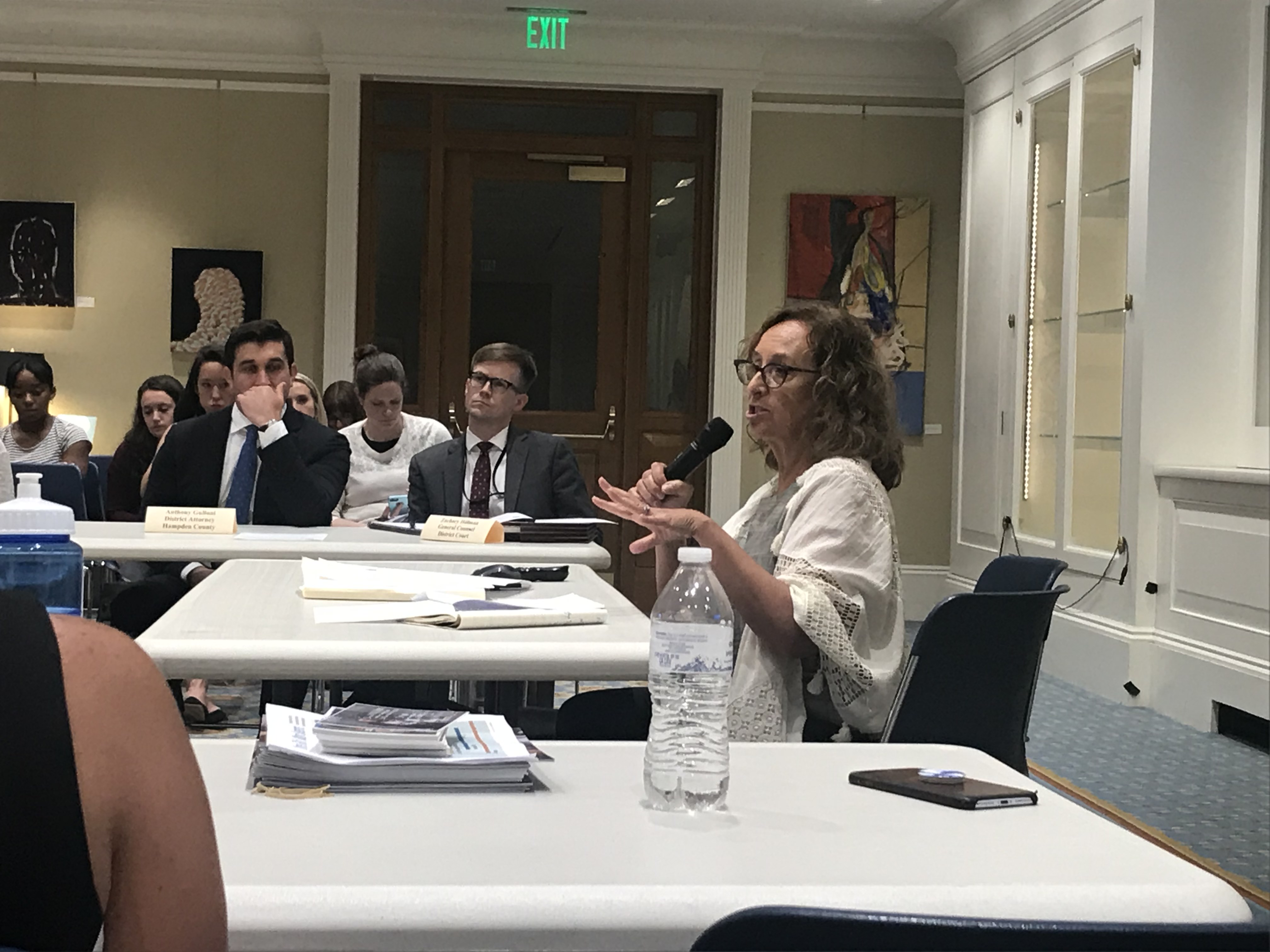Boston College Professor Francine Sherman testifies before law enforcement and legislators on how trauma leads younger women to commit crimes. photo by Sarah Betancourt
A group of legislators, advocates, and law enforcement officials met at the Massachusetts State House Tuesday, July 30 for a monthly meeting during which they discussed raising the age of entry into the adult prison system. But this time around, things were a little different.
The Emerging Adults in the Criminal Justice System Task Force focused the entire session on young adult women in the criminal justice system.
The task force was created under the sweeping criminal justice reform law, and is chaired by Sen. Cynthia Creem and Rep. Paul Tucker. Its members are tasked with making a recommendation to Gov. Charlie Baker in December. Currently, a young adult enters adult corrections upon his or her 18th birthday, unless there are special circumstances. That was raised from 17 back in 2013.
Multiple people testified, including Assistant Superintendent of the Hampden County Sheriff’s Office Patricia Murphy. Murphy discussed the Western Massachusetts Regional Women’s Correctional Center (WCC), which is currently housing 199 women with various sentences, and some awaiting trial.
The Chicopee-based facility allows supervised activities for mothers and children, including those in what legislators and scientists call the “emerging adult population,” or those in the criminal justice system between 18 to 24 years of age. One of the more alarming statistics reported by Murphy is that about 30 percent of women under the age of 25 in recent years have been involved in some kind of exploitation and trafficking.
When asked by Creem of the programming that exists for that population, Murphy said, “We have a support and education program with LIFT Services out of Worcester, and a trauma specialist has also come in.” The facility also provides referrals to local trauma specialists upon release. LIFT Services is a nonprofit resource and advocacy organization that works with survivors of prostitution, with the plan to open a 15-bed recovery home for individuals that have survived trafficking and left sex work behind.
While the young female population has some different needs than those who are older, Murphy said that substance abuse issues are similar across the board, and that older women are sensitive about being housed with younger women because of behavioral differences.
At WCC, women are in custody four an average of four months pretrial, and between two to five years upon sentencing. Murphy insisted that while there is no unit specific to emerging adult women, there is still individualized service.
For eastern Massachusetts, chief superintendent of Suffolk County House of Correction Yolanda Smith gave a surprising figure that invited questions from Creem and others. Smith said that as of Tuesday, July 30, there are no women between the ages of 18 and 25 at the facility.
“The demographics have truly changed in Suffolk County,” she said. “The average age is now 26 to 33.” Suffolk County currently holds 22 sentenced women, 28 women held through US Customs and Immigration Enforcement, and 38 awaiting trial. None are currently in the young adult age range.
Kyle Pelletier, Deputy Superintendent of Reentry at MCI-Framingham answered questions, mentioning that while the prison does not have a specific program dedicated to young adults, there is interest in studying the issue. The medium security women’s prison has not looked at programming from an age basis, she said, but services exist according to needs like detoxing, substance abuse, and medical care for women of all ages.
The discussion also focussed on at what services currently exist in the juvenile justice system, which is for children under 18. “Twenty-four percent of young women faced sexual abuse,” said Bridget Nichols, the manager for juvenile forensic services at the Department of Mental Health. A major part of the conversation for the task force was centered around discussing existing trauma services that exist in both the women and juvenile women’s systems, and what could be replicated on a broader level.
Francine Sherman a professor at Boston College Law School said that domestic, mental, and sexual trauma often lead younger women to engage in different kinds of criminal activities than young men.
“Women’s offenses are contextual,” she said. “Experiences of trauma lead to PTSD, depression, anxiety driven disorders, and struggle to maintain stability.” Younger women have a tendency to end up with an abusive partner who ends up asking them to hold drugs, which can often lead to charges. Because of unstable living and work situations, young women, are also more likely to commit drug and property offenses and fail to meet probation and parole requirements. For young women of color, the chances of these offenses being committed, and their being charged is even higher. Sherman also said black young women are three point five times more likely to be imprisoned than white juvenile females.
Past task force meetings have looked at biological development, with experts arguing that young adults do not have fully formed brains, which impacts decision-making for younger offenders. Legislators have also taken tours of juvenile detention facilities to weigh the differences between those and adult corrections.

Leave a Reply
You must be logged in to post a comment.